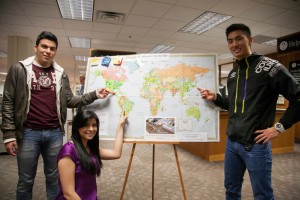
Brigham Young University falls below the national average for ethnic diversity of students on university campuses. All 50 states and 110 countries are represented among the BYU student body, but the overall percentages show a dominantly white campus community, according to the BYU Admissions Office.
As stated in the University Statement on Fostering an Enriched Environment, BYU values diversity among its student body including geographically, educationally, culturally, ethically, and racially. “BYU seeks qualified students of various talents and backgrounds … who relate together in such a manner that they are ‘no more strangers and foreigners, but fellow citizens with the saints, and of the household of God.’”
BYU does not require students to provide information about race. The Fall Semester 2014 voluntary report showed 16.6 percent of the student body self-identified themselves as non-white/caucasian and/or coming from an ethnically diverse background. The results calculated 1,217 Asian/Pacific Islanders, 755 Hispanics, 288 African Americans, 108 American Indians and 2550 reporting as “other.”
Kawika Allen, an assistant professor in the Counseling Psychology and Special Education department, stated how greater diversity could affect BYU campus in a positive way.
“We are actually being taught by them (ethnically diverse students) as they enter classroom learning environments,” Allen said. “We can all come together and learn from each others’ differences.”
The most diverse campuses within the United States are found in the coastal regions, according to the U.S. News and World Report. These areas include California, New York, Chicago, Boston and Texas. The mixed population of the geographical regions surrounding these cities allows for a greater pull of ethnic diversity for university student bodies.
BYU, as a church-run school, is known to attract the attention of LDS youth across all 50 states and countries throughout the world. Because of the ever increasing number of applicants, the Admissions Office has increased the academic standards of attending BYU year after year.
BYU offers a college preparation program for prospective multicultural students called Summer of Academic Refinement every summer. SOAR specifically assists multicultural students in preparing for the ACT and college admission process. Priority is given to students who have lacked opportunities in higher education, including those from a variety of different socioeconomic, cultural, geographic and family backgrounds.
The diversity of a university allows for a greater mixing of ideas and cultural understanding. Universities with higher diversity rates generally consist of students with higher levels of tolerance and understanding towards minority parties, according to the U.S. News and World Report.
Samuel Brown, Director of International Services at BYU, agreed there are benefits from having a diverse campus.
“I believe that those who bring unique perspectives, such as those listed in the University Statement on Fostering an Enriched Environment, stimulate and enhance the learning environment as they share those wonderful perspectives across campus,” Brown said. “Without those perspectives I think we lack a significant part of what education is all about.”
Allen said BYU has a reputation for being a university of white, middle class, Latter-day Saints. He also said the greater number of international student applications is causing BYU to place greater limitations on acceptance ratings as the LDS church continues to grow across the world and within the United States.
“Diversity is not a detriment to our learning; it is an enrichment,” Allen said. “It adds an increased awareness of other people in the world and allows us to learn from those who are different from us. By being surrounded by greater diversity, we will be better cultural and global neighbors.”
Allen also said the athletic programs at BYU bring a great deal of diversity to the student body. Additionally, faculty members are enlisted to recruit students of diverse backgrounds and help promote BYU to them. Overall there is still a lack of diversity, even among the teachers, which if changed, could have a greater effect on increasing ethnic representation, according to Allen.
“If we can increase both students and faculty then we might begin to see the campus climate, in terms of culture, change a little bit and for good,” Allen said.
Allen explained that with greater diversity comes the ability to understand those who did not necessarily grow up in the same environment on a more personal level.
“Life is about the refinement and ability to learn skills through people who are different from you,” Allen said. “Being surrounded by a campus of people of your same background causes you to be aware of everyone’s reactions. They would be similar to your own. When things become diverse reactions become more surprising and causes us to expand our mindset and grow. It is these situations that we learn and receive greater understanding.”




